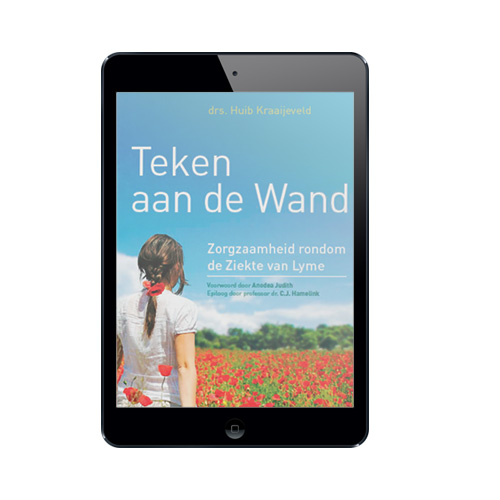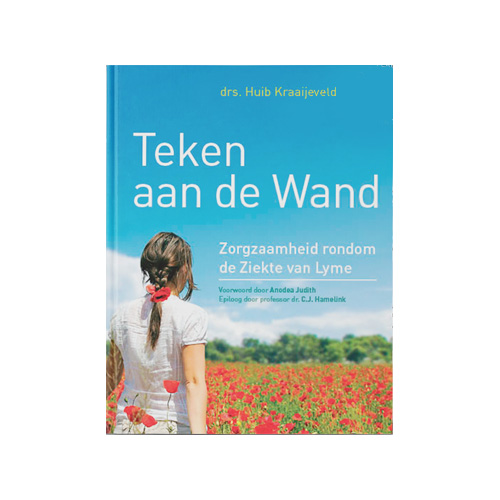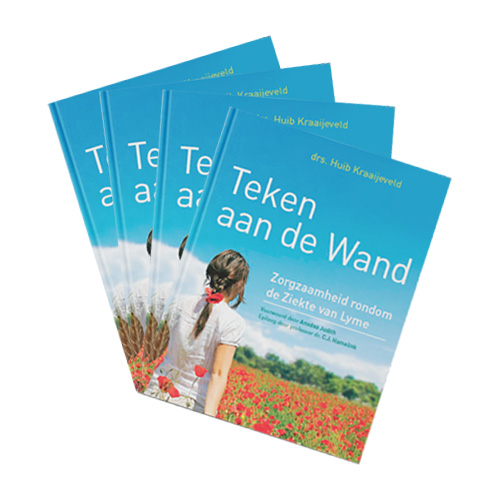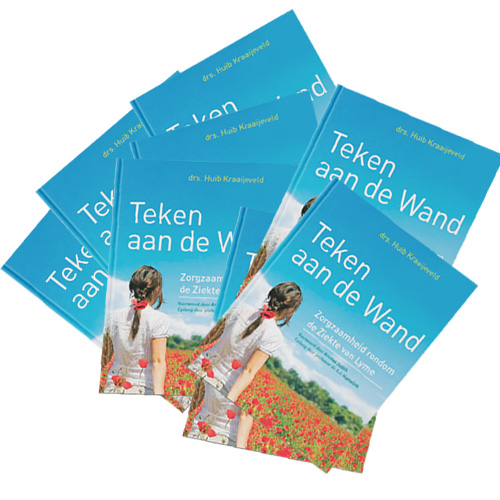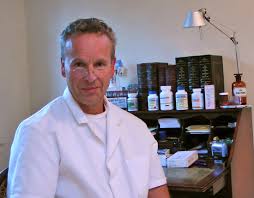
“A Postmodern vision on Medicine in society”
Written by Huib, published Sunday June 26th, 2016
On June 16, 2016 another article related to chronic Lyme Disease was published in the A-ranking Dutch Medical Magazines ‘Doctor & Patient’ and ‘Medical Contact’. This is the main source of information for Dutch doctors to learn about complex diseases such as Lyme Disease and the latest scientific insights about them. One of its authors is the professor who inspired me to sum up the incredible nonsense that doctors believe about Lyme, worldwide.
In this blogpost you will find the text of their article, which I translated into English for you. In an earlier post you can read another article (dating May 2016 in that same magazine) by a self proclaimed expert epidemiologist, Luc Bonneux, calling doctors treating people with chronic Lyme ‘conspiracy theorists’.
This earlier column provoked an open letter to Luc Bonneux by the scientifically trained Dutch Lyme author called Inge van Ulden, who neatly spelled out why unfounded opinions like these are very harmful for ill people.
The purpose of showing these articles first is that I have asked reliable and knowledgeable people in my network to reflect on the set. They are working on it now. If you are a layman (i.e. not a licensed doctor), you normally don’t have access to articles like this. Now you do.
Here is the original article by ‘my’ professor Jan Keppel Hesselink and professor Lex Bouter (VU hospital; one of the places claiming to be the Dutch Lyme Expertise Center). I translated it also to ask Thomas Grier to respond to it, which he did.
———————————————
“Science is but an opinion”
“Patients are no longer taking scientific evidence for granted. This undermines confidence in their doctors. To win back this confidence, good information and appropriate media strategy is needed.
Many doctors find that patients are increasingly expressing their opinions on what they think is wrong with them and what to do about it. This phenomenon fits within the postmodern vision of medicine.
Commotion and disagreements about medical issues are increasingly discussed in the media. For example, the question about whether or not to vaccinate and whether or not to use antibiotics in treating chronic Lyme complaints.
The discussion is usually highly polarised and the voice of science is only one of many.
Positions of, for example, the National Institute for Public Health and the Environment (RIVM) on topics such as vaccination and Lyme disease seem to have less and less authority. Distrust in medical practice and inaccurate information on the Internet complicates input from the caregiver.
Postmodern vision
The postmodern vision of the medicine seems to permeate the whole society. The scientific fact – thus the postmodern conception – is interwoven with commercial and political interests.
Within the postmodern medicine the experience of the patient holds as much value as scientific knowledge. Indeed, within the anti-vaccination movement ‘one’s own intuition’ is more appreciated than the scientific fact. (1)
We can dismiss this as irrational and stupid, but by doing so these views will not disappear. Individualism and the associated subjective truth are the foundation of the post-modern view of medicine. On this basis, the patient requires its own treatment or rejects antibiotics in chronic Lyme disease, or, denies HPV vaccination for its 13 year old daughter!
In conspiracy theories circulating on the Internet distrust against governments, companies and physicians is visible. A clear manifestation of distrust is the fear-based vision on vaccines. On the Internet it is claimed by many that vaccines are toxic, and that therefore they should be avoided.
Positions such as guidelines from the National Institute for Public Health and the Environment (RIVM) on topics such as vaccination seem to have less and less authority.
Wild rumours go viral immediately, like the one that claims that vaccines are wilfully lied about and are poisoned by the addition of agents that cause cancer and autism, and that the whistleblowers who have raised this issue have been murdered. To the layman, it is almost impossible to differentiate between galvanising fabricated lies and facts, while such scandals nourish mistrust.
Scepticism
With increasing scepticism the medical establishment is being regarded as authoritarian and arrogant. A good example is the recent position adopted by Care Institute of the Netherlands on the reimbursement of antibiotic treatments in chronic lymepatients [typo kept intact; HK].
“Prolonged treatment with antibiotics in patients with Lyme degree of persistence-emitting non-specific symptoms is not effective. This treatment is therefor excluded from the basic insurance package.”
The relevant [italics added; HK] scientific professional societies agree with this position. (2)
The opinions of these scientific professional societies are put aside by the Lyme patient group as unconvincing, biased and “a story, but not our story.”
Clarification
It is important that doctors and public authorities are aware of this postmodern context. To many there are appealing arguments that reduce medical science to just one opinion, together with the persuasive power of metaphors that undermine rational attempts to clarify certain issues by appealing to logic and scientific facts.
The answer to this ‘crisis of faith’ is not more experts, more scientific facts or more information. That does not work well in a postmodern time-joint.
We must first clarify this contemporary problem and analyse. Subsequently strategies can be formulated on how to deal with the distrust and uncertainty in our society with respect of medical practice.
Because the abundance of information not only leads to distrust of ‘medical facts’, but also to greater uncertainty. Should I allow my child to be vaccinated or not, or to undergo chemotherapy, take or not take antibiotics for chronic Lyme disease?
It is fascinating to see that viral messages can also have an important constructive communicative effect. Facebook owner Mark Zuckerberg took a picture of his two-month-old daughter, while they were waiting together for their doctor who would vaccinate the child. Zuckerberg had already indicated that there is no doubt that vaccines effective, save and important.
Restoration
‘Trust’ is the lubricant of society, and therefore also of health care. If all the players in the field were convinced herein, and see that working on trust is an important ‘responsibility’, then this would have profound implications for the nature and content of communication about health and disease.
Together, we will have to do everything to support and develop that trust. Not by withholding information, but by presenting this transparently and in its proper context.
An example. Early this year, the media was awash with the topic of (Dutch; HK) pharmacists correcting 40,000 prescriptions each day, because doctors make mistakes in their recipes. This message does not really help in restoring confidence in doctors.
It was announced by the KNMP [the professional and trade association for pharmacists in the Netherlands; HK] as a promotion movie about the new role of the pharmacist as a health care provider.
The intended positive effects of such a promotion for pharmacists are dwarfed by the damage to the medical profession, for it was predictable that it would effect an increasing distrust of patients in their physicians. How should one communicate such information?
You could explain that – this is fictive example – in 1999, 79 percent of all prescriptions were faultless, in 2010 85 percent, and after the introduction of the digital recipe in 2015 95 percent.
A second example of undermining the doctor-patient contact are the letters sent to patients health insurance companies, such as when pharmaceutical agents are required.
There are health insurance insurers that send letters to patients about how the therapy that is prescribed by their doctor is “not rational” and therefore is not reimbursed. Patients may perceive the judgment ‘not rational’ as a vote of no confidence against the prescribing physician.
Speed
Because of the speed at which messages can spread via the Internet, it is important that organisations working with medical information, such as the RIVM, quickly and eloquenty keep track of important topics, for example concerning around vaccination. If today an article appears about three patients with paraplegia after HPV vaccination (a hypothetical case), then that information will go viral on the Internet within hours.
It would be better if the RIVM first sends out a press release, preferably before the incident is public, so that they can at least can ensure a meaningful embedding. Apart from a press release, they should also react via social media immediately.
GPs and paediatricians who vaccinate should have access to a database, with continually actualised questions and answers about flu vaccinations, HPV vaccinations. In compiling such a database the RIVM would play a leading role.
Clear statements should be included in that database. For example, is there mercury in flu vaccines, and if so how?
Answer: the single vaccines used in the Netherlands contain no mercury influenza vaccination for many years.”
Such a database should be open and clearly deal with prevalent misconceptions and inaccuracies, and should also be accessible to journalists and interested lay people.
Fact box
Important insights in dealing with opportunities should be built into the answers to the FAQs, as indicated recently in an editorial in The British Medical Journal by Gerd Gigerenzer.(3)
An example is the question about the meaningfulness of mammography. In a simple matrix, called a ‘fact box’ by Gigerenzer, one can be shown that in a decade of annual mammography cancer specific mortality is reduced by one woman in a thousand, but this difference is not reflected in the total deaths from cancer, nor in the mortality rate as a whole.
Together with this information it also must be indicated how many of these thousand women undergo screening and unnecessary biopsy or (partial) breast amputation. Because an informed decision about mammography is only possible if the patient is presented this information in an understandable form.
Of course, the patient has the last say in the matter and there is room for personal preferences in weighing the pros and cons. But we must do everything to facilitate that assessment is made on the basis of the available scientific facts.
Patients are always looking for answers that exclude uncertainties. Both during medicine studies and in later education it is therefore very important to learn to cope with the uncertainties of the patient. The example of the ‘fact box is a good basis for clear communication on the available scientific facts.
This is the only rational solution that we can come up with in the context of the crisis of faith that is supported by postmodernism. We expect that many patients can be reached with such an approach.
However, there is always a group of extremists who will remain – unrelated to whatever facts – to ventilate container opinions, such as vaccinations are no good, chemotherapy is not working and chronic Lyme disease exists and needs long-term treatment with antibiotics.
Those opinions are not correctable with any facts whatsoever.”
Authors
prof. dr. Jan Keppel Hesselink. Fakultät für Gesundheit, University of Witten / Herdecke, Germany
prof. dr. Lex Bouter. Department of Epidemiology and Biostatistics, VU University Medical Centre, Amsterdam
Contact
Jan Keppel Hesselink: neuropathie7@gmail.com
cc: redactie@medischcontact.nl
Note
No conflicts of interest reported
References
Three references are suggested in this article, but these were not included in the pdf I received from JKH. I have no means to verify them.

"This book perfectly describes the plight of millions of patients, who suffer from chronic Lyme Disease in many countries all over the world."
Prof. Christian Perronne, France
"This book is a gift of truth and passion to humanity."
Mia Morales, Lyme patient, USA
"I received the book exactly on the day that I had decided to end my life. Huh?! Yep. I am 35 years old years and have been ill for 19 years. Now I know why: Lyme. Everyone should read this book!"
Miranda, the Netherlands
"This book offers a new practical, human centered way of dealing with health information. It is also ringing a bell for the new time how to work together towards health and thriving."
Kim Schimmler, MD, Germany
"This pioneer's work made it perfectly clear that, when "i" becomes "we", even illness becomes wellness."
Frans Vermeulen, journalist, the Netherlands
"In his crucial work on Lyme disease, dedicated social researcher Huib Kraaijeveld does not pretend to have all the answers, but guides us towards asking the upsetting and essential questions."
Prof. Cees Hamelink, professor Communication Sciences & Human Rights, the Netherlands
"This book reads like a thriller! It touched me deeply and I am sure it will change the course of history."
Linda Graanoogst, journalist, the Netherlands
"Well, I am wiping my eyes and blowing my nose, while tears stream down my face. I guess that is a good sign. You hit the nail on the head claiming that Lyme survivors need 'understanding'. I would like my own partner to read this book."
Anodea Judith, PhD & author, USA
"What an awakening perspective! Huib has successfully set a quantum leap for understanding and managing Lyme disease by common people."
John Wong, bestselling author, Singapore
"A true and unpretentious caretakers' guide to understand Lyme. This book will help you to completely understand what your friend is going through; regardless of the symptoms they have. I wish it had been written ten years ago, because it can actually save lives!"
Cheryl Versalle, Lyme patient, USA
"This book actually speaks to people beyond its target audience (caretakers of people with Lyme Disease): people like me who are not travel companions, but to whom it is not hard at all to have or develop understanding and compassion. This makes the reach of this book bigger, much bigger if you’d ask me. I am amazed a book can do all of this!"
Saskia Steur, business blogger, the Netherlands
"This book reads like an exciting novel, were it not that it concerns a deadly serious issue. It calls to contribute and take care of each other and our world. Read, weep, feel and act!"
Manfred van Doorn, leadership expert, the Netherlands
"A creative and very intelligent vision to dive even deeper into the world of Lyme, to look at yourself, other people, but also the entire world around you."
Friend of someone with Lyme
"The book indicates that Lyme disease can be a sexually transmitted disease. This will cause a tidal wave of awareness all over the world. Like the child in the old fairy tale The Emperor’s New Clothes, who exclaimed: 'But the emperor is wearing no clothes!'"
Ola Aniel Petterson, STD campaign leader, Sweden
"What a brilliant sociological work! I am sure it will have much impact."
Professor Neuropathy, Germany
"This book is a big eye opener. Both for friends of people with Lyme disease as well as for people with Lyme. Or for any other health issues, for that matter."
Martin Möhrke, medical research leader, Europe
"I cannot read any other book for more than two minutes now, in this hell called Lyme. Yet yours I cannot stop reading! I should have put it away hours ago to clean the house. But I simply cannot stop."
Ineke, wife of a husband with Lyme, the Netherlands
"This book is a delight to read. It offers soft candlelight and warm campfire camaraderie on an often dark and lonely journey."
Laura Bruno, medical intuitive Lyme expert, USA
"A very honest and yet witty way of helping those with Lyme disease. This book is full of ideas on how to help your friend with Lyme, as a travel companion on this crazy journey called 'Lyme'."
Lisa Hilton, Lyme advocate, USA
"Both the personal experiences as well as the author’s sharp mind turn this into an incredibly inspiring book that raises the consciousness of its readers."
Kara, ex Crohn disease patient, the Netherlands
"Tempting, informative and eminently readable! Shifting the Lyme Paradigm is an absolute eye-opener for those who are not aware of what the journey of Lyme disease entails."
Terri Mackinnon-Cross, CEO WorldLymeDay.com, Canada
"This book gave us the recognition and acknowledgment, which were like a band-aid on an open wound."
Sara, Lyme patient, Belgium
"Very insistently written based on intensive, almost existential, personal experiences, this book also gives a clear overview of all relevant information for both patients and caretakers."
Jan Eendebak, former chairman Lyme Foundation STZ, the Netherlands
"A relief to read, written by an expert who shares his dedication to his own path with us, and brilliantly written."
Muna, mother of a daughter with chronic Lyme, the Netherlands
"Playful, frightening, informative and encouraging."
Merel, kinesiologist, the Netherlands
"This book made me realize that there is too little known behind the phenomenon Lyme. In a challenging manner the author provides understanding of Lyme disease and suggestions for tackling this disease. I have 'prescribed' this book to many of my patients and mostly astonishment was soon followed by recognition. An absolute must for anyone with (still) unexplained symptoms or the people close around them."
Duco Kanij, osteopath, the Netherlands
"This book guides you through the labyrinth of Lyme swiftly, while it took us YEARS to even get this far."
Eugenie van der Linden, ex-Lyme patient and therapist, the Netherlands
"This book is an absolute 'must read' for everyone! For patients, for family and friends, and for doctors who can finally learn that Lyme is more than what is written in their textbooks and that they should not be able to dismiss "unexplained" complaints as psychological too quickly!"
Anne Fierlafijn, MD, Belgium
"Shifting the Paradigm of Lyme is not like any other book on Lyme that I have read. It appeals to a higher consciousness, and is analytical in an introspective way that is pleasant to read. This book is a friendly and warm reminder that no Lyme patient is ever alone."
Thomas Grier, biologist, USA
"This book show how caring friends can intervene to provide succor and alliance ‘against the odds’ of a potentially serious and very complex illness that is still poorly understood by mankind."
Kenneth Liegner, MD, USA
